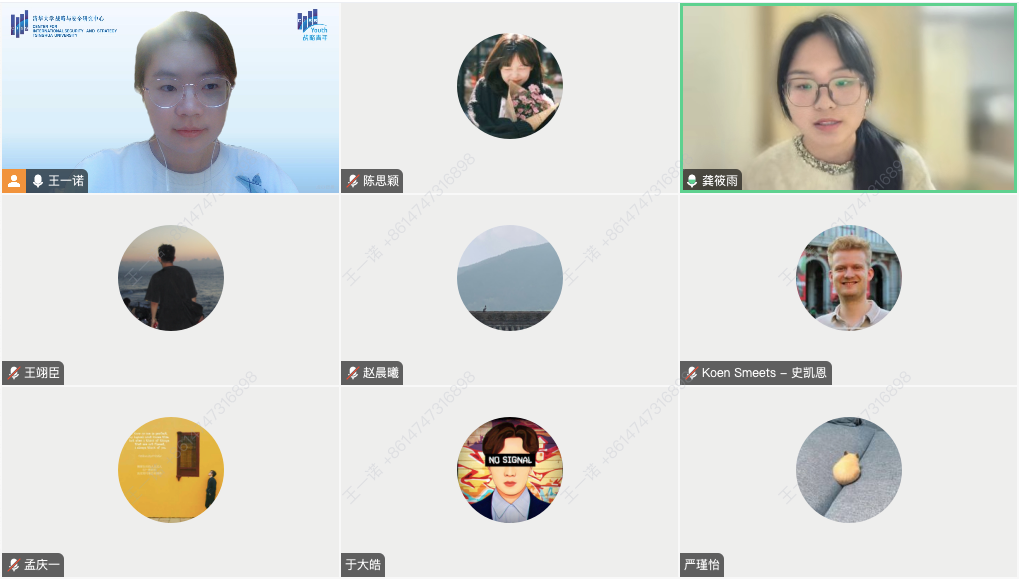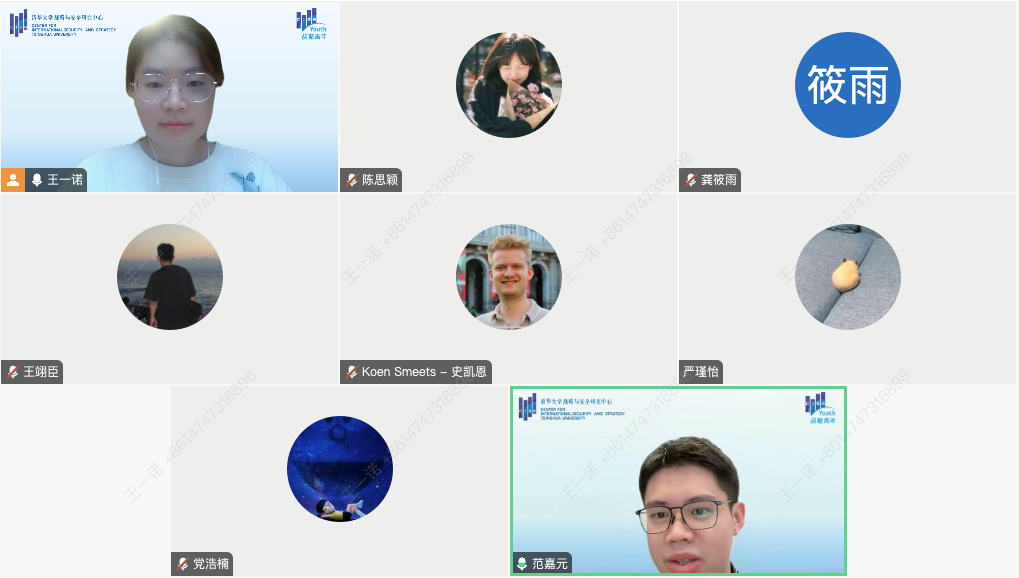On March 9, 2025, the Center for International Security and Strategy (CISS) at Tsinghua University successfully held the first review and exchange meeting for its CISS Youth “Academic Partnership” Program. Young members from universities at home and abroad—including Peking University, Fudan University, Renmin University of China, and China Foreign Affairs University—joined the event online. The meeting was chaired by Wang Yinuo, Director of the Academic Affairs Department of CISS Youth. As a mid-term review, this meeting provided a valuable opportunity to assess the program’s development since its launch in late December 2024 and explore directions for future improvement.
At the beginning of the meeting, Wang Yinuo outlined two primary goals: first, to inspire new ideas through experience-sharing among members and improve their participation in the program; and second, to gather feedback for addressing existing challenges and enhancing program mechanisms and quality. The session was divided into three parts: sharing outcomes and reflecting on practice, improving mechanisms and program development, and concluding remarks with a look toward the future.

During the outcome sharing and reflection segment, Zhao Chenxi, a master's student in Teaching Chinese as a Foreign Language at Peking University, spoke about her gains in choosing research topics and learning methodologies. With the guidance of her mentor, she explored topics such as securitization and the governance of artificial intelligence at the United Nations, while deepening her understanding of research methods in international relations. Gong Xiaoyu, a Ph.D. student in Global Affairs at China Foreign Affairs University, described a fruitful process of collaboration that included collecting policy documents on global AI governance during the Munich Security Conference, co-authoring a paper on algorithmic safety, and reviewing classic and frontier literature in the field under her mentor’s guidance. Lu Yilin, a master’s student at the Yenching Academy of Peking University, engaged in academic conversations with her mentor on overseas study and publishing, which broadened her understanding of international relations research methods. However, she also noted that deeper collaboration remains to be developed.

In the segment focused on program development and mechanism refinement, Fan Jiayuan, a master's student in Diplomacy at Peking University, proposed dynamic mechanisms for participation, communication, and incentives to improve the program’s overall structure. Yu Daha, a Ph.D. student in International Relations at Fudan University, shared three expectations for program development: increased faculty involvement through seminars and workshops; enhanced access to academic resources such as databases; and optimized collaboration frameworks that encourage peer-to-peer learning. Koen Smeets, a master's student in Chinese Politics at Renmin University of China, suggested using social media platforms to support academic collaboration, and shared his own experience in platform operations and future plans—an idea widely supported by other participants.
At the conclusion of the meeting, Wang Yinuo offered a comprehensive summary of the program’s progress and existing challenges. Communication between students and mentors has grown significantly in this phase, with all members having discussed their research interests and initial ideas with their assigned mentors. Many have established specific research directions and timelines and found tailored forms of collaboration; some have already formed structured and ongoing research partnerships. However, many members have so far achieved only limited academic outputs and practical results due to academic workloads, graduation pressures, the need for more time to clarify their research interests, and the complexity of evaluating topic feasibility. Despite this, participants expressed strong commitment to overcoming these challenges and increasing their involvement in the next stage. Looking ahead, the CISS Youth Secretariat plans to refine the program further by building a routine academic learning framework to promote joint reading of classic texts and the discussion of cutting-edge research within each group, encouraging two-way engagement between mentors and students—particularly urging students to take more initiative in inviting mentors to participate in relevant research and activities—and strengthening collaboration with CISS’s visiting experts to expand the scope of academic topics and establish a high-quality academic cooperation platform.
The successful hosting of this review and exchange meeting has clarified the future direction of the Academic Partnership Program. The Secretariat sincerely welcomes and looks forward to hearing from more interested faculty members and scholars who would like to participate (contact: cissyouth@163.com). With the joint efforts of students and mentors, the program will continue to improve, helping young scholars make greater academic and practical progress, and contribute fresh insight and knowledge to the field of global strategy and security.
CISS Youth is a research-oriented exchange program for young students and professionals in the field of international affairs. Guided by the Center for International Security and Strategy (CISS) at Tsinghua University, it is organized independently by youth and promotes strategic vision and global awareness through lectures, seminars, roundtables, and annual forums. CISS Youth also recommends and supports outstanding members to attend international conferences to learn, observe, and speak, telling China’s story and amplifying its voice on the global stage.
